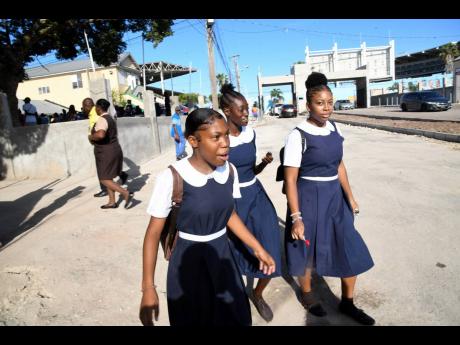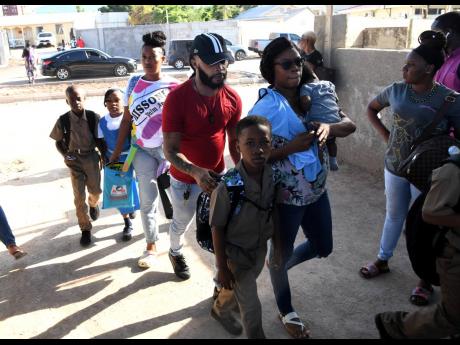Parents urged to help children prepare mentally for return to school
Less than a week remains before schools reopen on September 2, and experts are advising parents to support their children by preparing them psychologically for the challenges that may come with back to school.
Rory Roberts, centre manager of Teen Hub St Andrew, told The Gleaner yesterday that there are many reasons children can become nervous about going back to school such as peer pressure, striving to fit in and being accepted by others, the fears of being bullied and failing academically, and feeling inferior to others in areas such as appearance, for example, not having a brand-new school bag or brand-name shoes.
“They are excited, but they are nervous as well, and they don’t want to feel as though they are less than, and that is a talk that parents need to have with them,” he said.
It is for these reasons that children, he said, can become anxious and may display behavioural changes.
As such, it is crucial that parents first recognise that mental health issues are real and that it is exceedingly challenging for a child to deal with them on his or her own.
He noted how critical it iss for parents to have honest conversations with their children and to provide a safe environment in which they can express any worries they may have about going back to school.
“Sometimes we may go in and create some form of scene [at school], and sometimes the children don’t like that ... they don’t want you to come [to school] because it can come off as embarrassing. Not every child likes that kind of excitement where you want to go and cuss out teacher or fight another student in defence of your child,” he added.
“Ensure that you make your home a safe space where they can speak freely about whatever they are going through because the truth is, being a child, especially when you’re going through teenage years, there are so many issues affecting [them], and they don’t see where and who they can talk to about these things. They don’t trust anybody, so parents should create that level of trust,” Roberts said.
Teen Hub is a youth and adolescent centre that offers a secure environment. Among other things, the centre provides services such as career counselling, mental health counselling, and sexual reproductive health sessions.
Child psychologist Dr Orlean Brown-Earle shared with The Gleaner that parents must be careful not to “present as a bully” when dealing with their children and the issues they face at school.
PROVIDE NECESSARY SUPPORT
She pointed out that in order to support children’s mental health and prepare them for returning to school, parents should review their child’s most recent report card, adjust their expectations to avoid placing undue pressure on the child, and in the event that the child performed poorly, they should make sure that they are providing the necessary support this time around. If the child did not do well academically, parents must ensure that they are doing what they need to do to support the child.
“Parents should put plans in place to help the child, and this doesn’t necessarily mean going outside for help, which is a good thing, too, but they can structure a reading time at home with the child ... and read with comprehension, asking ‘Who? What? Where? When? And How?’” she said.
Brown-Earle also sought to urge parents to ensure that a psychological and education evaluation is done on their child, especially for those parents who have been asked by the school to have one conducted.
“The child may present with autism or learning disabilities whether it is dyslexia or dysgraphia or dyscalculia, and the child comes back to school without an evaluation and the same frustrations,” she said.
Brown-Earle also advised parents not to put too much pressure on their high school children and to help them understand that secondary school is a more competitive environment than primary school, with a wider range of classmates.
“Just like how they invested all that money and time [in primary school], they need to invest that money and time also in grades 7, 8, 9, 10, 11, 12. It doesn’t stop because their child passed for their first school [of choice]. That support must be continued,” she added.



